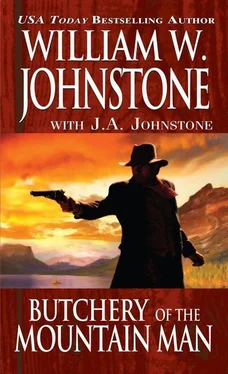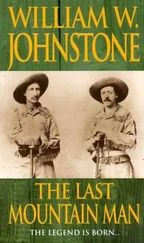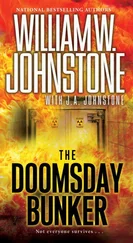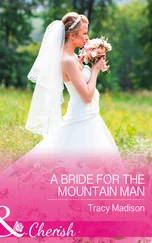“But we aren’t on Crow land. This is public land,” Smoke said.
“The Crow believe that any land they want is their land,” Ketano said.
With other signs of friendship, the Indians left, carrying bundles of buffalo meat with them.
On the Missouri River—December 1869
A bright sun, reflected back by the mantle of snow, made it necessary for both John and Smoke to keep their eyes at a squint. The river whispered slowly on its never-ending journey to St. Louis where, joining the Mississippi, it would flow all the way down to the Gulf of Mexico.
“Smoke, you do know we’re being trailed, don’t you?” John asked.
“Good for you, John, you’re picking it up fast,” Smoke said. “Yes, I know. I just wanted to give you the chance to mention it first. How many do you make?”
“Four, I think. Crow?”
“More than likely,” Smoke said. “You remember, Ketano told us they were trying to keep white trappers out.”
“Do we confront them? Or try and elude them?” John asked.
“We may as well face them down,” Smoke said. “We won’t have any peace, otherwise.”
“Look, just ahead,” John said. “See how that rock juts out toward the edge of the water? It will give us cover and concealment. And it’s big enough for both of us.”
“Yeah,” Smoke said. “Let’s get up there quickly enough to get our horses out of the way.”
Smoke and John urged their horses into a gallop, and the pack mules came along without much urging. They rode around behind the big rock John had pointed out, secured their animals, then climbed up onto the rock.
The rock was absolutely perfect for their purposes. It was in two steps, one step that allowed them to get into a kneeling position behind the second step, which was high enough to conceal them.
The four Indians were very skillful in their approach. Not one word was spoken, and they were handling their animals so adroitly that their unshod hooves could not be heard.
“When they get to about fifty yards from us, we’ll challenge them,” Smoke said. “Use my Henry. You can get your shots off faster that way.”
“What will you use?”
“If we wait until they are within fifty yards, I’ll use my pistol,” Smoke said.
The two men waited until the four Indians came around the bend. Then, suddenly, Smoke stood up. And seeing him stand, John did so as well.
“Stop there!” Smoke cautioned.
“Ayiee!” one of the Indians shouted. He was armed with a bow and arrow, and he raised the bow and loosed an arrow.
The arrow flashed by so close that Smoke could hear the wind of the arrow passing.
“You take the two on the right, now!” Smoke said, firing even as he said the word “now.”
John didn’t need a second invitation; he fired almost as quickly as Smoke, and jacking another round into the chamber he fired a second time as Smoke was also firing. In less than the time it took to tell about it, all four Indians had been knocked from their horses.
“Looks like at least two of them had repeating rifles,” Smoke said. “I see no sense in letting them go to waste, do you?”
John chuckled. “I see no sense at all,” he said.
Keeping wary, because Smoke knew that sometimes an Indian would fake death to get an advantage over his adversary, the two men approached the four Indians.
Extreme caution wasn’t necessary. All four were dead.
John picked up the two Henry repeating rifles, and examined them very carefully.
“Well now,” John said with a broad smile spreading across his face. “These are superb weapons. Absolutely superb. I’ll be quite happy to keep these.”
“Good,” Smoke said. “Let’s go find a place to get our traps in the water.”
Although there had been periodic snowstorms beginning in late fall, they were hit by a blizzard in the middle of December. They had no wagons to use in the construction of a shelter, but Smoke showed John a time-proven trick of survival he had learned from Preacher. They each carried a buffalo robe with them, and they wrapped the robes around themselves and dug in under a protecting bank. With the rifle set up, and the breech open, the barrel acted as an air vent. That way, they could let the snow drift and pile over them. The snow helped insulate them from the cold and, under the buffalo robes, their natural body heat, trapped by the insulated shelters, managed to keep them warm. They had a third rifle running between them, the barrel pointed toward John, and the open breech under Smoke’s robe. That way they could talk to each other, the rifle barrel carrying the sound between them.
“Can you hear me, John?” Smoke asked, speaking into the open breech.
“Yes, I can hear you,” John’s voice replied.
“Good, that means we can talk to each other while we’re waiting out the storm. But if you notice, the breech is on my side. So I would advise you not to say anything to piss me off.”
John laughed, then he stopped. “Uh . . . I assume you are joking.”
Smoke laughed. “All I’m saying is, watch your p’s and q’s.”
“Oh, I will. Believe me, I will.”
Old Main Building
“I take it you got through the blizzard with no difficulty.”
“Yes. We came through it fine.”
“How did the trapping go that winter?” Professor Armbruster asked.
“It went exceptionally well. I was used to trapping down in Colorado, and as I had told John, the rivers and streams there had been just about trapped out. But when we got to Montana, it was all virgin territory. First of all, you have to understand that the population of the entire state . . .” Smoke paused, then corrected himself. “Well, it wasn’t a state then. But the population of the entire territory of Montana at that time, wasn’t much over five thousand people. Not counting Indians, that is.”
Smoke chuckled. “Just for the fun of it, John and I figured out what the population density was then. It worked out to about one person for every thirty square miles.”
“Yes, I can see how that would have given you a lot of elbow room,” Professor Armbruster said. “Shall we walk over to the cafeteria for lunch?”
“Sounds like a good idea,” Smoke said.
Outside the Old Main building, several students had gathered, and they were singing:
“Glory, Glory, Colorado
Glory, Glory, Colorado
Glory, Glory, Colorado
Hurrah for the Silver and Gold!”
After the song, a cheer went up.
“Co lo ra dah
Sis boom bah
Rah rah rah!
Co lo ra dah”
“We are playing a football game against Denver tomorrow,” Professor Armbruster said. “It’s our fourth game, and the aggregate score of the first three games has been 152 to zero. So you can perhaps understand the excitement.”
“I guess I can,” Smoke said.
All during lunch the students were abuzz about the undefeated football team, and they were talking about the shellacking they were going to give Denver the next day.
After lunch Smoke and Professor Armbruster returned to the recording room.
“I’d like you to talk about Rendezvous, if you would,” Professor Armbruster said.
“All right.”
CHAPTER FOURTEEN
[ Rendezvous was an annual gathering held at various locations by fur-trading companies. The purpose of the rendezvous was to allow the fur trappers and mountain men to sell their furs and hides, and to make purchases of supplies and other goods from those vendors who accompanied the representatives of the fur-trading companies. The large fur companies put together teamster-driven mule trains which packed in whiskey and supplies into a preannounced location each spring-summer and set up a trading fair—the rendezvous—and at the season’s end, hauled the furs out.
Читать дальше












